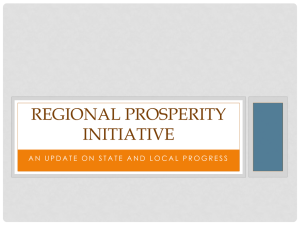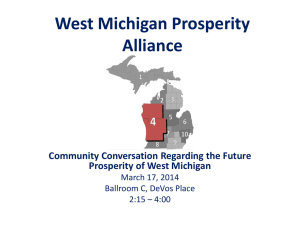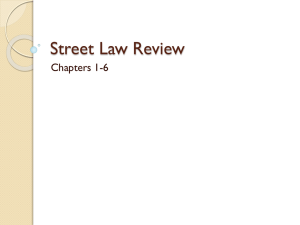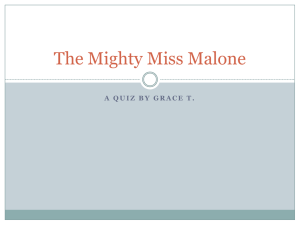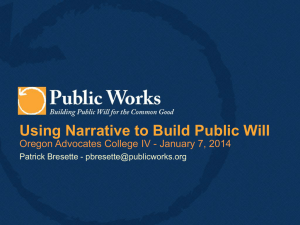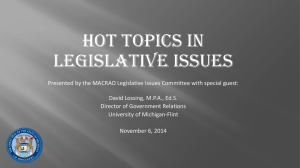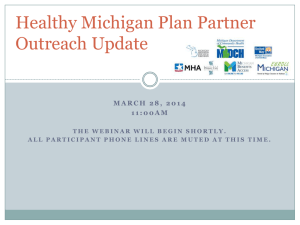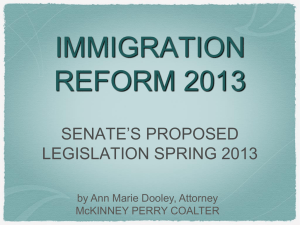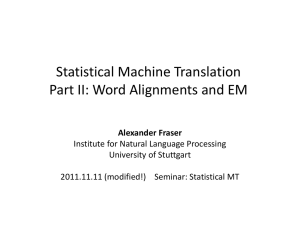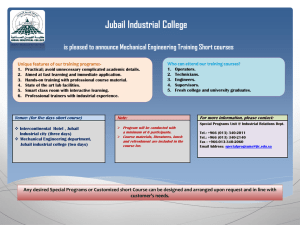Regional Prosperity Presentation 3/14
advertisement
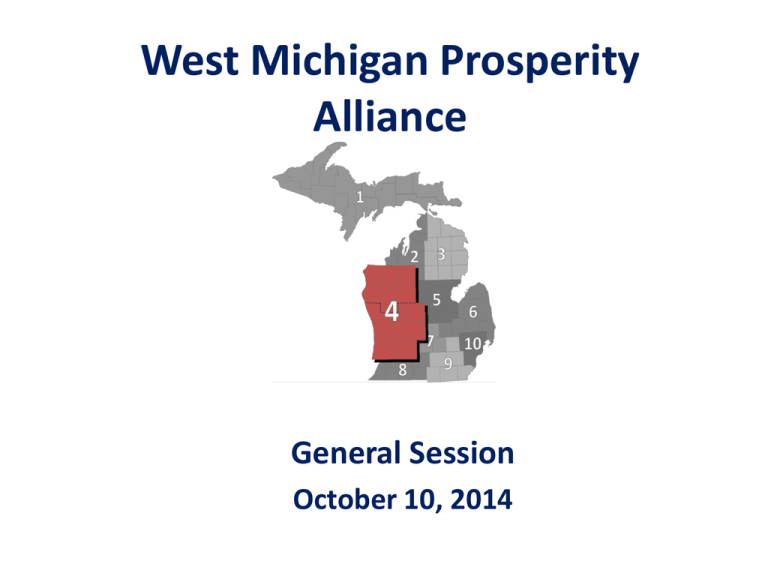
West Michigan Prosperity Alliance General Session October 10, 2014 Michigan State Senate Districts Michigan State House Districts September 26, 2013 125 Regional Representatives Attend Informational Meeting Regional Transportation and Planning Private Business/At Large Members Economic Development West Michigan Prosperity Alliance 25 Work Force Development Adult Education Higher Education Grant Awarded January 2014 Steering Committee Regional Transportation and Planning • John Weiss - GVMC • Dave Bee - WMRPC • Erin Kuhn - WMSRDC • Steve Bulthuis - MACC Economic Development • Bruce Adair - Lakeshore Advantage • Valarie Byrnes - Barry County Economic Dev. • Ed Garner - Muskegon Area First • Rick Chapla -The Right Place Higher Education • Fiona Hert - GRCC • Lynda Matson - WSCC • Dan RinsemaSybenga - MCC • Simone Jonaitis - GVSU Adult Education • Mike O’Connor - Adult Edu. of Zeeland P.S. • Kathleen Sullivan - Adult Learning Partners of West Michigan • Doug Wood - Orchard View Schools Adult Education Workforce Development At Large/ Private Business • Linda Brand • Paul Griffith - Model - Michigan Works! Community West Central Initiative • Deb Groeneveld • Jim Fisher - Michigan Works - Padnos Muskegon-Oceana • Roger Safford • Jacob Maas - MDOT - Kent-Allegan Michigan Works! • Andy Johnston - West Michigan Chamber Coalition • Jim Sandy - Mecosta County Dev. Corp. • Bill Raymond - Ottawa County Michigan Works! • Kevin Stotts -Talent 2025 Steering Committee Community Conversations Regional Prosperity Plan Plan Implementation Continued Regional Cooperation Some Simple Statistics About Our Region • 13 Counties • 341 Units of Government • 1,532,851 people (15.5% of Michigan) • 757,540 Labor Force (+1.5% since 2009) • 7.4% Unemployment Rate ( 4.7 % since 09) • 8,163 square miles, about the same size as the State of New Jersey • 130 Miles of Lake Michigan Shoreline and extends 75 miles to the heart of Michigan’s lower peninsula • 10,000 employers,$5.7 billion in economic output • Between 2000-2012 our population gained 86,575 or 6% while overall Michigan lost 55,500 residents. • Over 90,000 people commute into our region for work and over 114,000 residents leave the region for their jobs. • Employment has recovered from the Great Recession • Between 2009 and 2012, payroll jobs in the West Michigan Prosperity Region grew by 50,025 or 8.6%percent, more than twice that of the 4.0%percent growth statewide • 90+ school districts, 13 major colleges and universities, 70,000 college students What are the Required Deliverables? • A 5 Year Regional Prosperity Plan including and economic development blueprint • A performance Dashboard and measurable annual goals. • Monthly meetings to consider and discuss issues leading to a common vision of economic prosperity including economic development, talent and infrastructure. Community Conversations Criteria Can We Agree and Prioritize 6 Projects of Significant Regional Economic Importance? Potential Projects Final Projects March June September Community Conversation Governor’s Economic Summit March 17, 2014 180 Local and State Government Representatives and Business Leaders • • • • • Project Criteria Long term impact and sustainability Regional Impact Provide employment opportunities Recognize Regional Strengths and challenges Promotes public/private partnerships The West Michigan Prosperity Alliance • The West Michigan Prosperity Alliance (WMPA) will solicit projects from across the region and from across interests. • The WMPA will evaluate each project based on criteria established by the Alliance. • Almost 3,000 solicitations for projects were distributed • Thirty-one projects were nominated REGIONAL PROSPERITY Initiative AN UPDATE ON STATE AND LOCAL PROGRESS STATE PROGRESS REPORT • Alignment of Regions by Departments • Data Analysis by Regions • Continued Discussion with the Federal Government • RPI First Year Awards • Budget and Next Steps MEDC ALIGNMENT • Aligned EDCs, RENs, CAT Teams, URC, SBTDCs, etc. • Working to align PTACs and MACACA regional regranting • Required alignment of CDC funding priorities and RPI priorities this FY MDOT Alignment • Alignment Work is Ongoing • A boundary busters team has been formed • Active participants in many of our RPI teams MSHDA Alignment • Aligned all MSHDA regions including Homeless Assistance and Community Development Regions • Have assigned place making teams by region and are actively working to connect with RPI recipients WDA Alignment • Talent districts have been adopted by all! • Reported data provided will be assessed along the Prosperity Regions • All Mi Works Boards were eligible to participate in an RPI applications chose to participate in 1 or more DTMB ALIGNMENT • DTMB is providing regional data to help inform the RPI process • Other offices at DTMB are working to ensure that they can support the Regional Prosperity Initiative – Procurement – State Facilities – Technology MDEQ Alignment • MDEQ explicitly states on their website that they are part of the RPI initiative and has identified contacts for each RPI team • In addition, they have specifically realigned their brownfield redevelopment program map MDNR Alignment • Aligned DNR operations centers and include contact information by region here • First state department to consider the importance of regional data analysis MDARD Alignment Michigan Dept. of Ag. Rural Development • MDARD has aligned ag development specialists and supplied regional contacts DHS Alignment • DHS recently announced their new Business Service Center Regional Map • They are working toward a more regional approach by having stand out county directors coordinate regional strategies and work more closely with the department Department of Education • MDE’s regions have a number of complications including – ISD coverage – Funding model – Connection to other state service providers like Workforce Development • The department is analyzing how they can proceed with alignment in a measured way – First step is MDE regional support staff Military and Veterans Affairs • Reconfigured regions for regional service officer distribution Michigan State Police • Has worked to align District Posts with Prosperity Regions – MSP Director was one of the most anxious directors to receive notice of RPI recipients and begin connecting her team with local leaders • State police only have one additional region to align, emergency preparedness regions – These regions are connected closely to DCH regions and require interdepartmental work to move MDOC Alignment • FOA regions have aligned and contacts have been assigned • Currently working through an RPI- RFP that will conform to the prosperity regions • Recent benefit seen through greater connection to MEDC, WDA for employment outcomes Outliers in the regional model • A few departments have no existing service boundaries but have been asked to assign a point of contact for the RPI effort by region and to consider reporting data on a regional basis – Civil Rights (MDCR) – Treasury (MDT) – Departments of Insurance and Financial Strength (DIFS) DATA ANALYSIS BY REGIONS • Power of data analysis by regions • LMI and DNR were the first to begin such analysis • Other departments have been directed to follow • Other data sources to be considered as well – Gallup Well-Being RPI Grants • First Round-2013 – DTMB received 11 applications, all from eligible applicants – Funding requests exceeded available dollars, totaling more than $3m – Applications were reviewed by the award committee based on evaluation criteria made available to applicants prior to submission – 7 successful applicants • Second Round-2013/2014 – Applicants who were not successful in the first round addressed specific concerns and were eligible to reapply in round two – All unsuccessful applicants reapplied – Again, funding exceeded available dollars by more than $300,000 – 4 applicants reapplied, all were successful at some level Applicants and winners Applicants and winners Where we were January 2014 What a Difference in 9 Months Governor Discusses RPI GVMC/RPI Board Meeting June 6, 2014 • 17 out of 20 State Agencies are Complete • Regional Reinvention Task Force to Advance Governor’s Regional Prosperity Initiative Review of Projects • • • • • • Project Criteria Long term impact and sustainability Regional Impact Provide employment opportunities Recognize Regional Strengths and challenges Promotes public/private partnerships Next Steps • • • • • Review and Prioritize the 6 Projects Insert the projects in the Prosperity Plan Steering approves Prosperity Plan Application for 2015 Continue to Promote Regional Cooperation and Collaboration while providing assistance to the 6 Regional Projects • Expand the Steering Committee to Include Foundations and Non-Profits West Michigan Prosperity Alliance General Session October 10, 2014
